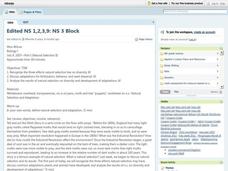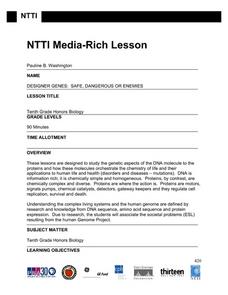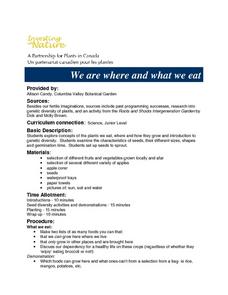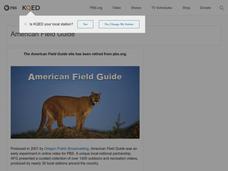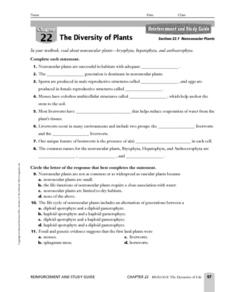Foreign Policy Association
U.S. and Europe Online Lesson Plan
Class groups investigate the economic and political implications of a country's policies on genetically modified foods, craft a position paper detailing that policy, and share their findings with the class. Armed with this...
Curated OER
Plant Structure and Growth
This plant structure and function PowerPoint addresses the main organs and the factors that affect its development as well as going into detail about the specializations at a cellular level. The cell functions and system...
Curated OER
Genetics: Mice Rule! (Or Not)
Students explore genetics and evolution by examining a hypothetical mouse population. Using coin tosses, they determine mouse traits of parents and offspring. Finally, they consider the outcomes of changing environmental conditions on...
Curated OER
Genetic Analysis
Young scholars formulate a hypothesis regarding the validity of the current status of the Arizona Hedgehog cactus as a distinct variety of cactus. They design a procedure to isolate DNA from the tissue of plants, given a list of...
Curated OER
Wetland Plant Detectives
Sixth graders identify plants in the wetlands. In this plant detectives lesson, 6th graders complete a scavenger hunt on a local reserve, record observations, and respond in their journals.
Curated OER
Natural Selection And Evolution
Middle schoolers investigate the concept of evolution and how natural selection is used as an indicator that evolution has happened. They recognize the three effects it has on diversity and how adaptations can develop. Diversity is...
Curated OER
Temperature and the Tomato
You will need a photovoltaic system and monitor at your school in order to obtain all of the data required to thoroughly implement this lesson. Your class monitors daily temperature and insolation amounts over a two week span of time....
Curated OER
Discovering the Wetlands!
Students name wetland plant and animal life. In this ecosystem lesson students go birdwatching and interpret native plants through art.
Curated OER
Species and Specimens: Exploring Local Biodiversity
Students practice skills essential to all scientific investigation: carefully observing and collecting data. They become field biologists in a series of hands-on activities to collect and identify specimens, and survey and calculate the...
Curated OER
Biodiversity Activity
Students are introduced to biodiversiy. They use a simulation of two forests, one planted with only Douglas Fir trees, and one with diverse species of trees. Students also use the simulation of two forests, one a monoculture of only one...
Curated OER
We are where and what we eat
Students explore concepts of plants they eat, where and how they grow and are introduced to genetic diversity. They examine seed characteristics, look at their different sizes, shapes and germination time. They also set up seeds to...
Curated OER
Physiological Adaptations
Students investigate the concepts of genetics and how it is tied to the variations found within different species and how it is tied to adaptations. They review the theory of evolution and factors found to help create variation. The...
Curated OER
A Mendel Seminar
Students analyze Gregor Mendel's discovery of a process of biological evolution. They also explore how recessive and dominant traits are passed from one generation of living organisms to the next. This instructional activity involves...
Curated OER
Flowers and Plants
Students are assigned to bring five flowers. They explore flowers to distinguish different physical features of flowers. They compare and contrast different flowers to determine what features they have in common. Students develop an...
Alabama Learning Exchange
Botany Scavenger Hunt Where's the Ginkgo?
Learners use a science journal to log plants that are native to Alabama. In this plant lesson plan, students identify characteristics, describe environments, and classify the plants that they find.
Curated OER
Smallest Thing
Students compare characteristics of myobacteria and viruses to determine which is the smallest life form. They read and discuss an article that presents different viewpoints on the definition of life to determine their own viewpoint.
Curated OER
Nonvascular Plants
In this nonvascular plant worksheet, learners compare the characteristics of bryophyta, hepatophyta, and anthocerophyta. This worksheet has 8 fill in the blank and 3 multiple choice questions.
Curated OER
Relationships and Biodiversity
Students examine diversity on the planet and the differences within a species. In this investigative lesson students complete a lab that allows students to better understand the relatedness between plants.
Channel Islands Film
Island Cattle Ranching
Is cattle ranching on Santa Rosa island viable or non-viable? Rather than focusing on the issues of the transition of Santa Rosa island from a privately owned island cattle ranch to a national park, class members are asked to consider if...
Curated OER
Trees of our Forests
Young scholars use a field guide in order to identify trees. In this trees lesson plan, middle schoolers classify the trees that they identify based on their relationships. Young scholars take a trip outdoors to look at trees.
Curated OER
Tropical Forest Food Chain
Learners explore the interdependence of the animals and plants in tropical rainforests. They explore the importance of conserving biodiversity and tropical food chains. They create a tropical forest food chain and identify species that...
Curated OER
Cutt-Off Genes
Young scholars explore how gene sequence analysis can be used to examine phylogenetic similarities of different organisms. Students work in groups to simulate a gel electrophoresis separation of fragments using poster board to create...
Curated OER
Will Biotech Crops Solve World Problems?
Students read an online article to examine what biotechnology and agricultural biotechnology are. They answer questions and complete worksheets based on the article's information.
Curated OER
Co-evolution of Plants and Pollinators
Students, while studying the rolls of pollinators and plants, explore co-evolution of mutualistic relationships.







